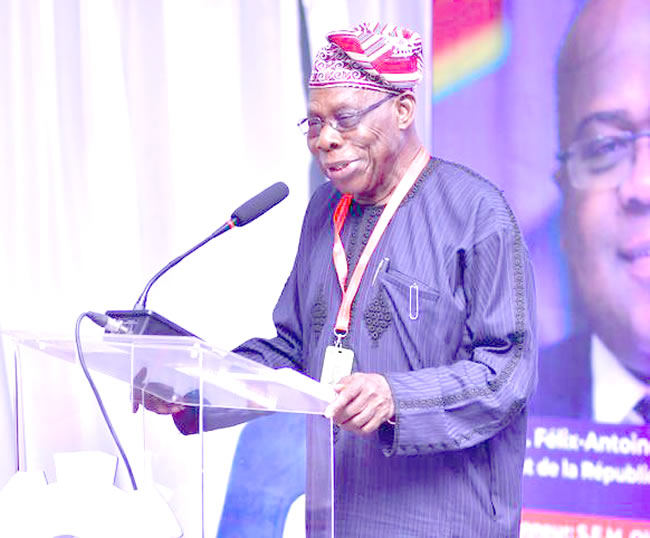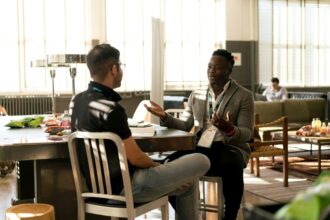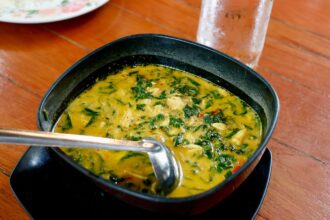Enveloped by global acclaims he has been receiving from the feat he achieved recently due to the critical role he played in the signing of a peace deal between the Ethiopian government and the Tigray People’s Liberation Front (TPLF) which led to ceasefire, former Nigerian president, OlusegunObasanjo, is building on his image as a global statesman and a foremost African personality. In his acknowledgment of Obasanjo’s role in the Ethiopia/Tigray war ceasefire, UN Secretary General, Antonio Guterres, taking special cognizance of Obasanjo’s role in the peace talk that led to the parties agreeing to a “permanent cessation of hostilities,’’ lauded the Nigerian leader as an African mascot.
Hardly had he finished swinging this feat that took place in South Africa, with negotiations that began on October 25 in Johannesburg and concluded after 10 days, than Obasanjo began another African initiative. This time, it was an initiative of a vision for industrialization of Africa where Obasanjo is wooing African investors to come together. This initiative is particularly between Nigeria and Democratic Republic of Congo (DRC).
On Monday, November 31, 2022, the former Nigerian president gathered a team of Nigerian leaders, investors and government top-shots to discuss the need for Africans to come together for greater prospects of the continent. The meeting, which held in Kinshasa, DRC, had two Nigerian governors, four industrialists, security and energy experts, among others, on investment drive to the Central African country. This, Obasanjo is embarking on, with the strong collaboration and request of President Felix Antoine TshisekediTshilombo of the DRC.
A day before then, Tshisekedi had hosted the team to dinner. There, he commended the role of Obasanjo in the quest to transform DRC into an industrialized country, saying specifically that “Baba accepted my request to bring prospective investors to Congo when I told him, and I must say I am very happy and pleased to welcome you all. He is father of Africa and the people of Congo will continue to appreciate him for his role in bringing peace and unity here.”
The delegation was in DRC on the sidelines of the 8th edition of the MAKUTANO forum, organized at the presidential city of the African Union in Kinshasa. A DRC-Nigeria Roundtable then took place under the patronage of President Tshisekedi with the theme: “Opportunities and models for the creation of Congolese national champions”.
This business meeting was sponsored by former Nigerian President Obasanjo who came to the DRC with about twenty Nigerian businessmen. These men shared their experiences with their Congolese counterparts. The Director General of the National Agency for Investment Promotion, (ANAPI) Antony Nkinzo, and the Congolese Minister of Finance, Nicolas Kazadi drew up the picture of the business climate in the DRC and the macroeconomic framework of the country. National Ministers of sectors related to the business climate and investment were also present as panelists of this roundtable, with companies from the Congo moderating the fruitful exchanges between the economic decision-makers of the two countries.
Nigeria and DRC are two major countries on the African continent with huge business potentials accruing from their natural endowments, vast geography and massive populations.
With a total land area of 2 344 885 km² and straddling the equator, DRC is the third-largest African country. It is only bested by Sudan and Algeria. Because of DRC’s geopolitical position on the African continent, it is strategically positioned in the entire central African region, with its possibilities spanning the entire world. Its strategic geography is such that it is located at the heart of the African continent and shawled by nine neighbouring countries of Angola, Burundi, Central African Republic, Congo-Brazzaville, Rwanda, Sudan, Tanzania, Uganda and Zambia. DRC’s Congo River basin is so important due to its coverage by dense tropical rainforest, making it to be the country’s principal geographical feature. Between the Congo River and the Atlantic Ocean is a short coastline that can be a huge resource.
However, in spite of its mountainous geography, with DRC possessing two different time zones, the country is sparsely populated. Its estimated population by July 2007 is 65 751 512 in July 2007, made up of 250 ethno-linguistic groups who are further divided into four main cultural categories of the Bantu, Sudanese, Nilo-Hamitics and the pygmies, with the Bantu being the largest group. Four national languages of Lingala, Kiswahili, Tshiluba and Kikongo are spoken and the implication of this being diverse ethnicities of the DRC, with multifarious cultural traits.
In terms of religion, DRC boasts of a majority of Christian population, with a rough 46 to 48 per cent of this being Roman Catholics and about 24 to 28 per cent being Protestants. The most renowned of the Christian totems in DRC is the Kimbanguist Church which was named after Prophet Simon Kimbangu. This church boasts of hundreds of thousands of members, especially in the Bas-Congo province. DRC is not without a Muslim population but it is minute, compared to its Christian population. Statistics say this population is about one percent of the population and they are mostly based in the Maniema province. This is not to say that Congolese are not also animists. DRC has a traditional African believer population but is negligible and French is the country’s official language of communication.
DRC is however loaded with economic prosperities in consumer market, liberalization of insurance industry, oil and gas, forest industry, relative growth of middle class, banking and telecom sectors, infrastructure rehabilitation and reconstruction, hydroelectric power, mining (copper, cobalt, diamonds, gold, coltan, etc.) textiles, plastics, pharmaceuticals, electrical machinery, automobiles (especially off-road vehicles and heavy trucks) food (rice, wheat, dried milk products, canned and frozen meat (particularly poultry), fish, tree crops, agricultural processing) food processing equipment and parts, forestry, bilaterally or multilaterally funded infrastructure projects (e.g. World Bank-funded projects) microfinance (e.g. financing of Small and Medium Enterprises (SMEs)) agricultural equipment, among many others which investors can tap into.
Other areas in which DRC is a fertile multi-million dollar investment enclave is in agriculture.Field farming, animal rearing and the planting of various spices and crops are investment-yielders in the Congo. This less value on agriculture has resulted in just two per cent of its arable land being used for farming. Thus, there is the need for cassava processing for a variety of food and industrial uses. Researches have already shown that industrial production of cassava in Congo has a lot of room for profit.
ALSO READ FROM NIGERIAN TRIBUNE
- AMAA 2022: King Sunny Ade, P-Square Dazzle As Nigeria Leads With Eight Awards
- Chelsea will win EPL -Koulibaly
Another area of investment in the DRC is the fruit juice and jam factory. This is because mango, orange, pineapple, banana, cashew nuts, cabbage, and other fruits and vegetables grow well in the country.
In the DRC, the furniture business is another fecund area of investment. Research shows that by 2025, the world’s estimated furniture industry will gross US$800,596 million. In Congo, the forestry sector is extremely lucrative and its forests are about 13 million hectares. Other areas of interests for investors are the food markets.
The International Business Forum that brought the investors of both countries together was organized by the Makutano Network. In the end, Obasanjo delivered the closing remark where he insisted on the work being done as a matter of course. He also underscored the need for follow-up of this forum’s decisions and romanticized the spirit of enterprise as a driving force for the positive transformation of African societies in the full phase of industrialization.
Obasanjo also reiterated how imperative the need is to understand that African investors should tap into the potentials in Congo. He urged Africans to come together for the greater prospects of the continent, irrespective of their countries.
According to him, the peculiarities of DRC, including being the only country that borders nine other countries, the only country in Africa with two time zone and not being ‘muzungu’, and as such, “the delegation is here and have come to stay and do business in DRC.”
In his words, the money to invest in Africa is already available in the continent, and “as such, we must ensure that we create that conducive environment to get that money for these investments to come up in the country. As said earlier, we have come with people that have something to offer, something to learn from. This meeting will not be like the usual meetings that will end here. I don’t want that to happen. We have to form the Nigeria/DRC business Council or whatever name we will call it for the continuity and progress of this meeting today.”
At the forum, former President Obasanjo named Congolese-born Dr. Nteraya Sanginga, the Director General IITA, as the Interim President of the forum and Kaduna State Governor, Mallam Nasir El-rufai, the Interim Deputy President, while Pacific Kahasha, a Special Adviser to President Tshisekedi and Ambassador Leke Adebiyi as Interim Secretary and Interim Deputy Secretary respectively. Other interim officials chosen by Obasanho included Nicole Sulu, Ex-officio and Okey Opara while Obasanjo himself, and President Tshisekedi Tshilombo will be Patrons.
Obasanjo charged the council to start work immediately, saying, “after 6 months the council performance will be reviewed.”
The delegation to the DRC included Chukwuma Soludo, the governor of Anambra State; Governor El-Rufai, Gen. Martin Luther Agwai, Professor Bart Nnaji, Professor Peter Okebukola and Ambassador Robert Adeleke Adebiyi. Others were Semiu Kolawole Adesina – Sahara Energy Limited Nigeria, Ajibola Adebutu – CEO/Founder JB Farms Lagos Nigeria, Mrs. Stella Okoli – Founder and CEO Emzor Pharmaceuticals Industries Limited, Dr. EdemAdzogenu–Co-Founder, Afrochampions, Dr. Nteraya Sanginga – IITA Director General and Jimi Lawal – Senior Adviser and Counselor to Kaduna State Governor.
The delegation also drew a list of prospective investors in the DRC-Nigeria business combine asGeneral Agwai (rtd), Alhaji Aliko Dangote, Mr. Jim Ovia, Professor Chukwuma Soludo, Governor El-Rufai,Mr. Tope Shonubi ofSahara Energy Ltd.;Mr. Benedict Peters of Aiteo Global Group; Mr. Herbert Wigwe, Dr. Taiwo Afolabi, Prof. Bart Nnaji of Bells University of Technology; Dr. Stella Okoli, Dr. Edem Adzegenou, Mr. Paulos Gomes, Mr. Eyo O. Ekpo and Mr. Hassan Usman, among others.








